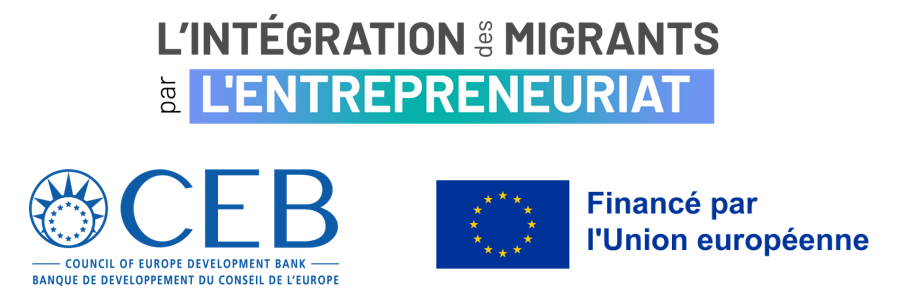He was a hairdresser for over 20 years in Iran and she sold clothes at a market in Somalia. Having come here, they work for someone else, whereas their dream is to set up their own business. They simply do not know how to get started or where to find the right information. Spotlight on the journeys of these entrepreneurs from other places, their challenges and difficulties, as well as on the concrete actions to make entrepreneurship ever more inclusive.
Brussels: land of diversity and opportunity
As the capital of Europe, Brussels is also a multicultural city where many nationalities live side-by-side, a significant proportion of which originate from outside the EU. According to figures from the Belgian Statistical Office Statbel, in 2023 47% of Brussels residents were of foreign origin, from countries outside the EU. In Belgium, 32% of these people have received higher education, compared with 27% of the local population. It is a veritable melting pot of knowledge and know-how! Yet, despite their skills and potential, many of these people from these countries encounter obstacles to their socio-professional integration, even though they may be filling gaps in the job market or setting up their own businesses. And in the process, they are also building a social network, mastering the language, gaining autonomy and self-confidence ... in short, finding their way in their new country.
Do entrepreneurs, migrants or not, have the same struggle?
Embarking on an entrepreneurial adventure is never without its hurdles, but the evidence is clear: people from migrant backgrounds encounter additional difficulties when they want to set out to become entrepreneurs.
There are three types of difficulties:
Administrative barriers
I was a nurse in Albania, says Zulma. Getting my residence permit was a long process. I was turned down several times before I got it. My aim was to become self-employed in the care sector, but I did not know what to do or where to go to have my diploma recognised. It was a real nightmare ...
Launching your own project and becoming an entrepreneur requires a wide range of skills - in your own sector of activity, but also in terms of business management - as well as a high level of motivation, flexibility and adaptability and resilience. For people born in another country, there are additional obstacles to starting up a self-employed business. For example, a person who is a non-European national will need to take additional steps to be able to exercise an activity (professional card). He or she will also encounter obstacles related to the recognition of his or her diplomas or professional experience abroad.
Difficulties accessing information and support
Finding the right information is the first difficulty raised by migrants wishing to set up a business in Brussels: what are the administrative formalities, obligations, taxation, where to find help, financing, etc.?
For a person of foreign origin who is unfamiliar with the workings of local institutions and/or has a poor command of the national languages, finding support and financing is not easy, explains Hassan, who is in the process of opening a Syrian restaurant.
To overcome this, it is essential to encourage better collaboration between actors that provide entrepreneurship support and reception offices for newly arrived immigrants (BAPA), but also to reach out to new arrivals, and find the right channels to give them access to all the information they need, preferably in their own language.
Lack of access to financing
The majority of migrants or refugees, let alone those who do not speak one of the national languages, have no access to bank credit. Lack of banking history, unfamiliarity with administrative rules, lack of collateral or personal contribution are often mentioned as explanations. Alternatives such as microcredit exist, but they need to be better known.
Entrepreneurial dreams without borders
Karine is originally from Armenia. After arriving in Belgium in 1999, she took on a series of jobs as a waitress in various bars and cafés. As her salary didn't allow her to support herself, she decided to start out on an entrepreneurial adventure.
As a graduate in Economics and after having worked in business in Armenia for 18 years, Karine didn't need any coaching to start up her business and carried out all the administrative procedures herself. Firstly, she opened a café in Anderlecht with the support of microStart. In 2019, just before the pandemic, she opened a new café: Wiel's Renard Noir. microStart also supported Karine in this new project!
These three categories of difficulties are amplified by the language barrier, cultural differences and unfamiliarity with local rules. Finally, let us not forget the personal obstacles faced by migrants and refugees. Leaving your country, home and family to head off into the unknown is never an easy choice or one made lightly: it is an uprooting.
Making entrepreneurship accessible to all!
Since June 2023, hub.brussels and the microcredit organisation microStart have been involved in a European Union pilot project called PAFMI ("Partnerships and Financing for Migrant Inclusion"). The aim of this project is to promote the inclusion of migrants through entrepreneurship, by means of concrete actions enabling the removal of the obstacles mentioned above.
"Both partners contribute to the project, each with their own expertise," comments V. Flammang, Head of the hub.info service within hub.brussels, which provides information and guidance to all those who are starting or want to start a business in Brussels. "Our role at hub.info is therefore to inform migrants, preferably in their own language and via their respective communities, about all the requirements and the assistance available for starting up their businesses in Brussels. People who call on our services are also referred to the wide range of public and private entrepreneurship support available in Brussels, in terms of coaching, financing, accommodation, etc."
Since 2011, microStart has been providing financial support through microloans and coaching before and after business start-up, enabling people who are usually excluded from traditional bank credit to access credit and finance their projects.
What are the concrete solutions?
In concrete terms, in 2023, 487 participants were reached through 20 information sessions held in French, English, Spanish, or with translation into Arabic or Ukrainian.
Since January 2024, the frequency of these sessions has been increased, and several are organised each month, in different languages.
In June, three longer sessions are also held in French, English and Spanish, featuring testimonials from entrepreneurs with a migrant background who have launched their own businesses, as well as a networking opportunity. For people with a business project or idea, it is an opportunity to meet entrepreneurs from their community who have set up their own businesses, to draw inspiration from their journeys, to benefit from their experience and advice and, finally, to network with other project owners. The schedule of all upcoming dates is available here.
To make a success of this ambitious project and remove the barriers to entrepreneurship for people from migrant backgrounds, it is also important to involve actors who provide support to entrepreneurs so that they can better help people in their business creation process. Two networking events with these actors, as well as workshops to enhance their knowledge, have been organised since the project was launched, to enable them to better meet the needs of potential migrant entrepreneurs (specific administrative formalities such as the professional card, intercultural communication).
A plea for sustainable solutions
Within the framework of the PAFMI project, it seemed essential to draw up an overview of these difficulties and propose possible solutions based on contacts in the field. A plea with recommendations for removing the obstacles to entrepreneurship for people from migrant backgrounds was therefore drafted.
Numerous stakeholders were consulted for the text: migrants and refugees wanting to start their own businesses or already operating in Belgium, the United Nations Refugee Agency (UNHCR), the reception offices for newly arrived immigrants (BAPA), and other associations working with migrants, not to mention the feedback from advisers and staff at entrepreneur support organisations in Brussels, who meet people born elsewhere wanting to start their own business here, on a daily basis.
They all raised the same obstacles with us and share the desire to improve access to entrepreneurship for people with a plan and potential to create their own jobs and make a positive contribution to society, both economically and socially.
This plea will be officially presented on 23 May and co-signed by numerous partners supporting entrepreneurship in Brussels.
Would you like to take part in one of our "How to start a business in Belgium" information sessions?
- The schedule of all upcoming dates is available here.
- Sessions with testimonials and networking are planned:
Would you like to find out more about our plea and recommendations for removing the obstacles to entrepreneurship for people from migrant backgrounds?
This project is funded as part of a wider agreement between the Council of Europe Development Bank (CEB) and the European Commission (Directorate-General for Home Affairs); its aim is to improve the inclusion of migrants in EU Member States through the development of new partnerships and new forms of financing.

